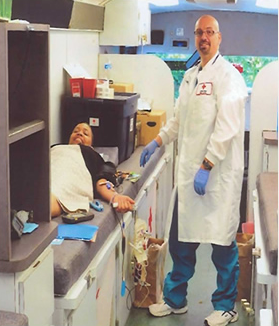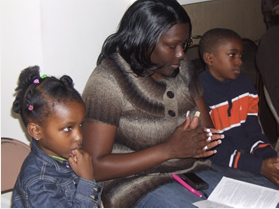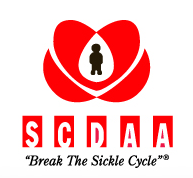What is Sickle Cell Disease?
Sickle cell disease is an inherited blood disorder affecting the red blood cells. People with sickle cell disease have red blood cells that become hard and pointed instead of soft and round. Sickle cells cause anemia, pain and many other serious health problems.
It is the most common genetic disease in the US. Approximately 100,000 Americans have sickle cell disease.
Normal red blood cells are round like doughnuts, and they move through small blood tubes in the body to deliver oxygen. Sickle red blood cells become hard, sticky and shaped like sickles used to cut wheat. When these hard and pointed red cells go through the small blood tube, they clog the flow and break apart. This can cause pain, serious health problems damage to other organs, and a low blood count, or anemia. Sickle Cell is a life long chronic health condition that affects the young and the old.
Who is affected by Sickle Cell Disease?
While it primarily affects persons of African descent, it is also present in Portuguese, Spanish, French Corsicans, Sardinians, Sicilians, mainland Italians, Greeks, Turks and Cypriots. Sickle cell disease also appears in Middle Eastern countries and Asia. In the United States it is estimated that over 80,000 people have sickle cell disease. Over 1,000 babies are born with the disease each year in America.

Board Member, Beverly Lucas, Donating Blood

Family Education

Advocating on Capital Hill
Why is it called Sickle Cell?
Many red blood cells in people with sickle cell disease look like a sickle, a tool used by farmers. So a red blood cell shaped like a sickle is called a sickle cell.
How does a person get Sickle Cell Disease?
The gene that causes sickle cell disease is called the S gene. If a person gets one S gene from one parent and one S gene from the other parent, they will have two S genes or SS. If they got the S gene from one parent and a gene for different abnormal hemoglobin from the other parent, they would have another form of sickle cell disease.
Does Sickle Cell Disease make a person sick?
Yes, sickle cells block the flow of blood vessels resulting in lung tissue damage, pain episodes, and strokes. It also causes damage to most organs, including the spleen, kidneys, and liver. Damage to the spleen makes sickle cell disease patients, especially young children, easily overwhelmed by certain bacterial infections, resulting in hospitalization.
What is Sickle Cell Trait?
Having Sickle Cell Trait means that you carry the gene for sickle cell disease that can be passed on to your offspring. A person with sickle cell trait makes the usual hemoglobin called A and some of the sickle cell hemoglobin called S in the red blood cells. Put the two together in a red blood cell and you have sickle cell trait,
A + S = AS.
How does a person get Sickle Cell Trait?
A person gets or inherits sickle cell trait the same way they inherit the color of their eyes or hair. A person inherits sickle cell trait through the genes that their mother and father pass on to them. Genes also tell the body what kind of blood to make. A person with sickle cell trait receives an abnormal gene for hemoglobin S from one parent and the normal gene for hemoglobin A form the other parent, A + S = AS.
Does Sickle Cell Trait ever make a person sick?
Sickle cell trait is not an illness. People with sickle cell trait are healthy. On rare occasions, individuals may have blood in their urine. Sickle Cell Trait can never turn into Sickle Cell Disease.
A person’s inherited hemoglobin type is theirs for life. Hemoglobin type does not change.
If someone has Sickle Cell Trait, can they have a child with Sickle Cell Disease?
Yes, if the person’s partner also has sickle cell trait or the trait from another hemoglobin disorder.
What should a person with Sickle Cell Trait do?
In planning a family, it is wise to ask your partner to be tested in order to understand what the possibilities are for your baby to have sickle cell disease. Teens and adults should be tested to see if they carry the gene for sickle cell disease.
What can I do to help?
Get involved with The Sickle Cell Association of New Jersey, Inc.
The Sickle Cell Association of New Jersey provides:
- Education focusing on presentations at churches, schools, and community events
- Health care provider education
- Seminars for individuals and families affected by sickle cell disease
- Education presentations and events for adolescents/young adults with sickle cell disease
- Policy maker education (e.g., Advocacy Day at the Capitol)








